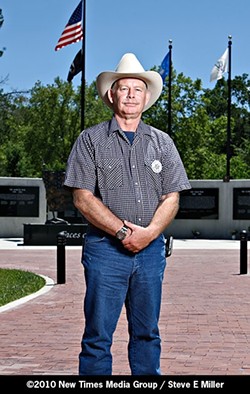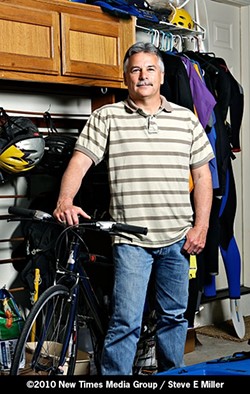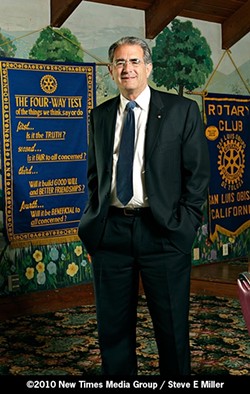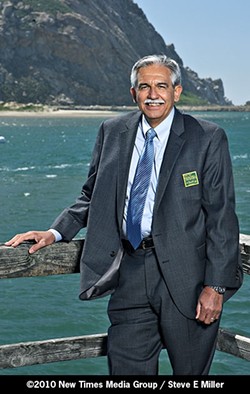Who can turn it around?
Six candidates vow to reform a department wracked by scandal and discontent
By Matt Fountain and Robert A. Mcdonald[{
"name": "Newsletter Promo",
"id": "NewsletterPromo",
"class": "inlineCenter",
"insertPoint": "4",
"component": "15264767",
"requiredCountToDisplay": "0"
},{
"name": "Ad - Medium Rectangle CC01 - 300x250",
"id": "AdMediumRectangleCC01300x250",
"class": "inlineCenter",
"insertPoint": "8",
"component": "2963441",
"requiredCountToDisplay": "12"
},{
"name": "Ad - Medium Rectangle LC01 - 300x250",
"id": "AdMediumRectangleCC01300x250",
"class": "inlineCenter",
"insertPoint": "18",
"component": "2963441",
"requiredCountToDisplay": "22"
},{
"name": "Ad - Medium Rectangle LC09 - 300x250",
"id": "AdMediumRectangleLC09300x250",
"class": "inlineCenter",
"insertPoint": "28",
"component": "3252660",
"requiredCountToDisplay": "32"
}]
It’s high noon and the winds of change are blowing though the unincorporated streets of San Luis Obispo county: A new sheriff is coming. Six candidates with extensive law-enforcement experience are vying to replace Sheriff Pat Hedges, who is leaving office.
The six men—a retired police chief, a police captain, a retired California Highway Patrol officer, a former police sergeant who was a county supervisor, and two current sheriff’s deputies—are running not only against each other, but against Hedges’ legacy as well (see New Times, May 13).
The candidates all pledge to make a clean break with the past. Several express identical priorities: gang suppression; emphatic support of Second Amendment rights; and faithful adherence to all state laws, even those that conflict with federal laws.
The sheriff is more than the chief of law enforcement; he’s also the county coroner and runs the jail. He’s in charge of more than 400 employees and manages a $57-million budget. The new sheriff must deal with shrinking resources: A $2-million budget reduction is likely this year, and more drastic cuts are expected to follow.
New Times interviewed candidate Mark Adams at the Veterans’ Memorial in Atascadero, while police officers rehearsed a ceremony to commemorate law-enforcement officers who were killed in the line of duty, that was scheduled for the next day. Adams seemed composed as he fielded questions on the bleachers, as 12-gun salutes vollied. Adams is a San Luis Obispo County deputy sheriff.
“My opinion is we’ve lost contact with people within the department. We’re no longer a family,” Adams said. “We have correctional officers and deputies arguing over who’s more important. You cannot do anything else within the department unless you change the style of leadership.”
Adams spoke of rebuilding public trust in the department, emphasizing he favors an open-door policy and would invite the media to shadow him at work. Improving department morale is a priority and so is economizing: “We’re no different than any other governmental organization; there’s waste. I don’t care if it’s a thousand dollars or thousands of dollars, it’s still taxpayer money that’s going down the drain with nothing to show for it.” Adams repeatedly said an effective sheriff must “think outside the box,” to embrace new ideas and technology. “Otherwise, you’re going to go the way of the dinosaur.”
Adams pointed to his 22-year career within the department as evidence he knows the steps necessary to unite factions and improve department performance. He would rely on the leadership training he received in the Army, where he interacted with those under his command; a disconnect he sees within law enforcement.
Regarding Hedges’ performance, Adams gives him a “C.” “He’s done and allowed some things to go on in the department that he should have known better,” he said. “I think the good things he’s done have outweighed the bad, it’s just that the bad things have been so glaring.”
Adams disparaged the influence of politics on law enforcement he observed during the last 12 years. “Whether it’s the politics within the sheriff’s department or the politics outside the department, when you allow political correctness and political agendas to rule on how you make decisions, it’s never going to turn out well for you,” he said.
There would be a significant change in the way the department interacts with news media under his leadership, according to Adams. He would dispense with the full-time public information officer position now held by Deputy Rob Bryn. “If we have a critical incident, somebody from my command staff will show up, including me,” he explained. “There’s nothing wrong with us getting in front of the camera, saying this is what we know, this is where we go from here, and we’ll get more information to you as soon as we are able. We don’t need a public information officer to do that. I think it’s a complete waste of money and it’s another insulation of the sheriff from the news media.”
On the contentious split of the Deputy Sheriff’s Association, the union that had represented most officers, Adams said it was just another sign of a dysfunctional family. “I believe it was the wrong thing to do,” he sighed after a brief pause. “I think the sworn had some legitimate concerns, but at the same time, they didn’t give the chance to see how the DSA would be run with a majority of the correctional staff on the board. I think personal feelings, greed, and misinformation—along with hatred and revenge—caused the downfall of the DSA.”
Like some of his opponents, Adams claimed the county has a gang problem. “Just because we’re only seeing the tip of the iceberg doesn’t mean that it’s not there. In fact, we don’t even have an accurate count of how many gang members we have within the county.” He believes measures to provide healthy alternatives, not arrests, are the best deterrents. “We need to give our school-age kids from first to eighth grade alternatives and training in gang resistance, just like we do with DARE [drug abuse resistance education]. If we don’t, we’re going to see what we see in east L.A. and parts of Fresno and Santa Maria, even: We’re going to see bars on the windows and things like that if we don’t get a handle on it now.”
Regarding the prospect of new medical cannabis dispensaries, Adams underscores his job is to uphold state law. “Medical marijuana, because it has been approved by voters in this state, I have no problems with it. Doesn’t mean I’m going to go out and start smoking dope,” Adams said. “The dispensaries will be treated no different than the liquor stores and supermarkets that sell alcohol and tobacco … My issue is not with the dispensaries—which I think are doing a good thing for the sick—I take issue with the profiteers, the quack doctors who are handing out medical marijuana cards left and right,” Adams said.
Regarding illegal immigrants, Adams said, “If the state of California enacted an immigration law like they did in Arizona, I would enforce it,” He continued, “Now, I am not going to set up checkpoints or raid homes or engage in profiling. And I know our deputies, our employees within the department, and they are not racists. If our state enacted such a law, I would have complete faith and confidence in our deputies that they would enforce it fairly … Honestly, though, I think we first need to secure our borders. That’s step one in my opinion and that ball’s in the court of the federal government.”
Like candidate Michael Teixeira, Adams is a member of an organization called the Oath Keepers, a somewhat controversial, so-called “patriot group” comprised of current and former military and law- enforcement members. Some critics have called it a militia organization that fears a takeover by the federal government. Adams doesn’t agree. He said membership is merely an affirmation of the ideals for all who have sworn to uphold the law.
“Look, I’m a patriotic person. I believe in baseball, hot dogs, and apple pie in the United States of America,” Adams said. “When you consider the amount of power the sheriff has, he has the ability to shut down every avenue into and out of this county. You don’t allow things to happen in this county that you saw in Hurricane Katrina, for example. You don’t allow the federal government to send in the National Guard and allow your men and women to accompany them in seizing and violating the Constitution. You don’t allow them to quarantine, or basically set up a concentration camp, merely because you don’t know what else to do. There were individuals there in the Super Dome, who, given the chance, could have gone and stayed with relatives elsewhere. But once they were there, they couldn’t leave. There’s no justification for that in my opinion.”
Regarding the criticism of the Oath Keepers as paranoid and fearful of the government, Adams shakes it off. “I’m using Katrina as an example, but do I believe the federal government has plans to do that? No. What it means to me is simply that I will never give an order to my men and women that I believe violates the Constitution.”
Interviewing a former police chief at his home—safe territory—about his candidacy could have been awkward, but Joe Cortez was relaxed, informal, and the easy conversation sometimes veered to outdoor recreation, the perks of living in Pismo Beach, and his personal rewards from a life spent in law enforcement. The former Pismo Beach Chief of Police has been described as “a regular guy,” someone who, “doesn’t seem like a cop.” It’s a perception he likes. “That’s one of the things I want to bring to the sheriff’s department: a sheriff who’s out of the ivory tower, someone you can talk to,” Cortez said.
Despite his easygoing demeanor, Cortez has a reputation as a strong reformer who shook up a police agency torn by internal strife. Cortez joined the Pismo Beach Policzhief in 1995. “The things that I fixed in 15 years as a chief in Pismo parallel what we’re seeing in the sheriff’s department now: a lack of community trust, poor media relations and a lack of communication between line and management,” Cortez said.
Within three years, the department under Cortez’s leadership attained accreditation from the national Commission on Accreditation for Law Enforcement Agencies, the fifth municipal police department in the state, and the only department in the county, to earn such accreditation.
Though he takes exception with many of Hedges’ decisions, Cortez pointed out the Ag Crime unit, sex-offender registration, and gang-tattoo-removal program as admirable achievements.
He did, however, criticize the sheriff’s department for lack of transparency and disregard for public input, which he attributes partly to the current department stance toward media relations. “I feel that our job with the media is to educate the public about their safety. And the best thing we can do is give them accurate, timely information,” Cortez said. “I may have a more liberal media policy than many of my peers but it’s never burned me before. As far as the PIO [public information officer] position, I think that is a luxury the department may not be able to afford, at least on a full-time basis.”
Cortez said he favors deputies—those who are closest to casework—being accessible to the press. “I think it would make for a much better story coming from someone who was actually there, instead of information repeated secondhand. In Pismo, all of our officers were [eventually] allowed to talk to the media, and I’d like to see that continued in the sheriff’s department,” he said.
Cortez also spoke of implementing a citizen review board. “I’ve never been in favor of that before, but because of the state of the department right now, I think it’s necessary,” he said. “And we should have absolutely no fear of communicating to the community what’s happening.”
Regarding medical marijuana, Cortez observed, “I’ll simply follow the law,” and added, “As far as the dispensary in Morro Bay, that’s a Morro Bay issue. If they were to ask us for some assistance, we would gladly do what we can to help. But ultimately Morro Bay will retain ownership of that problem. We’re not going to come in and take over.”
When asked about illegal immigration, Cortez said he approves of the current policy of checking the immigration status of those booked in county jail. He said a department under his leadership would continue to notify the federal U.S. Immigration and Customs Enforcement agency if an individual is found to be here illegally, but would first concentrate on local criminal charges.
He questions Arizona’s new immigration law. “We are so shorthanded with deputies as it is. The last thing I would want to be involved in is using our deputies to do federal work. I’m about community policing: My job is to keep the community as safe as we can, and to do that I need information. We need people coming forward who know about crime, who have been victimized. And the law in Arizona just kicked to the curb 15 to 20 years of good community policing and I can’t imagine many people coming forward now. It’s just a shame.
“Furthermore, I would love someone to explain to me how they can enforce the law without profiling. It’s just impossible. In fact, I would be very surprised if this law wasn’t deemed to be unconstitutional.”
Cortez said he would aggressively fight criminal gangs. “When people talk about border security, these are the borders I’m talking about: the Santa Barbara-San Luis Obispo border, the Monterey County border. We need to keep those gang problems confined to those areas.
“Year after year, we throw money at the problem and we continue to have problems. I’m not sure what impact we’re making by trying to arrest our way out of the problem,” Cortez said. He said he would take the existing task force and use them as intelligence officers to target gang leaders from the top; find out how they make and spend money. He also mentioned community injunctions, along with parental involvement, early prevention and deterrence.
As the Pismo Beach chief, Cortez received FEMA certification for disaster planning. “The sheriff is, after all, the point of contact between the state Office of Emergency Services and our local agencies. I’m the only [candidate] certified top to bottom by FEMA’s incident management system.”
In particular, Cortez is proud of his performance as a financial steward: “In all my years, I’ve never overspent a budget by a nickel and I’ve never lost a nickel of the taxpayers’ money being on the wrong end of a lawsuit.”
San Luis Obispo Sheriff Commander Ben Hall, 57, has the look of a grizzled ‘70s TV policeman. He’s a 35-year sheriff’s department veteran who seems to have had jobs in every sector of the organization, including the jail and the courtroom detail, and has served as a patrol commander for nearly every area of the county. Hall talks more like a cop than a politician; his answers are direct. And it’s doubtful Sheriff Hedges is a fan. Hall ran against Hedges eight years ago and criticized him during recent candidates’ debates.
“I have no excuse for bugging other employees,” said Hall, during a forum in April. “There is no excuse for employee reps sleeping with county representatives. I can’t wind back the clock, but remember I am not the person who was responsible for these acts and it will not happen in my reign.”
Asked how his law-enforcement philosophy differs from his boss, Hall quickly answered, “Well, I don’t bug places, to start off with,” said Hall. “I believe someone should have an expectation of privacy in their office.” (Hedges secretly videotaped a deputy in the department. The county paid $660,000 to settle a lawsuit the deputy filed because of the spying).
Hall said he believed the department should be decentralized, with more responsibility and accountability given to lower level officers, as opposed to Hedges’ tendency to centralize power.
Moreover, Hall said his experience in the department gives him an advantage in budget matters, compared to other candidates. “I understand the budget,” he said. “I understand the personnel behind the numbers. I understand the history behind those positions, and I understand exactly what each service provides the public. I’ve lived that budget for many years.”
Hall intends to preserve and even expand areas of the budget to combat what he views as the most dangerous threat to San Luis Obispo: gangs. He said the public does not recognize the threat. “It just takes a stray bullet hitting a seven-year-old and then the gang issue becomes urgent,” said Hall. “Gangs are the biggest threat to the quality of life to this community … Gangs have destroyed the quality of life of neighboring areas.”
He would seek gang injunctions: court-ordered restrictions that would prevent gang members from loitering in certain locations and from wearing “gang” clothes. Hall would devote resources to early gang intervention in schools.
He does not dispute the use of medical cannabis; provided dispensaries are true cooperatives run in strict accord with state regulations and meet community approval, he said. He maintains the sheriff’s department should do more to combat meth and heroin addiction. “Of course I want to put these low-level users in jail,” Hall said. “But the object is to get the person off of drugs and back into society.”
He promised to adhere to the letter of the code regarding applications for permits to carry concealed weapons. “You have to come up with a good cause to have that weapon for personal protection,” he said. “Simply personal protection alone doesn’t meet the requirements.”
Jerry Lenthall has a tough, no-nonsense reputation as a former SLO police sergeant and county supervisor. But Lenthall was gracious when a New Times reporter arrived late for an interview, and soon warmed up as he answered the many questions thrown at him. As the interview progressed, he became even more animated as his ideas poured out. Clearly, the man loves law enforcement.
Lenthall was a San Luis Obispo police officer for 30 years and was a county supervisor for one term before losing his 3rd District seat to Adam Hill in 2008. In the 2008 supervisors’ election, the Deputy Sheriff Association threw its support behind comparatively liberal Adam Hill, not Lenthall, though Lenthall was widely perceived to be more in tune with the law-enforcement community.
Lenthall said one of the reasons he lost the DSA endorsement was because he opposed giving non-sworn officers the same retirement benefits as personnel on frontline duty received. He said he took that position because the “economic bubble was leaking” and the county was heading into difficult financial times.
The top priority for law enforcement, according to Lenthall, is preventing gang intrusion from neighboring counties. As gang suppression becomes more efficient in surrounding counties, gangs will likely be pushed into this area, he believes. “We need to look at more than arresting these people,” Lenthall said.
More deputies should be put back on patrol, he proposed, as many as there were 11 years ago: 11 more than now. He admitted that may seem unlikely to achieve considering expected budget cuts, but insisted it can be done with careful financial management. “I do have a concern that we can’t afford to lose another deputy,” Lenthall said. “It appears on the surface the management has not taken as similar cut as the line staff does.”
Lenthall feels the county animal shelter should be returned to the authority of the sheriff’s department. He said the head of animal services could be replaced by a sheriff’s deputy and the money saved could pay for another deputy on the street.
Lenthall wants to recruit more volunteers from the more than 400 local retired law enforcement officers to augment the department in the era of leaner budgets. “We need to learn to do more with less,” Lenthall said.
He advocates more integration of the health department with the county jail, and supports the sentencing of first-time offenders to public service. “There are people who need to be there but for first-time offenders, I think there are ways we can reduce our costs,” Lenthall proposed. “I think that is a way that society can really benefit.”
Apparently everyone knows Ian Parkinson: When he was recently interviewed by a New Times reporter, the conversation was interrupted more than 15 times by people waving or saying hello to him. He’s been a policeman since he was 19 years old, and is a captain in the San Luis Obispo police department, where he heads operations; running day-to-day police activities, budget preparation, and the investigations section.
Parkinson spoke of changing the culture within the sheriff’s department to achieve more openness. There is a severe divide to be healed between the sworn deputies and the corrections department personnel, he said. “I think communication from top to bottom is vital,” Parkinson clarified. “If people don’t have a chance to express their views they don’t communicate very effectively.” The actions of a few have affected the whole organization, and the department, he said, deserves fair and open leadership.
“The transparency is not there and it’s affected the public perception of the department,” he observed. “There’s good people over there. You can’t put a blanket over your problems and expect them to go away.”
Parkinson has taken flack for being endorsed by the Deputy Sheriff Association (DSA), which now consists mostly of corrections officers (most of the deputy sheriffs broke from the DSA and formed their own union).
In the past, an endorsement by the DSA assured a candidate’s election. Hedges was always heavily supported by the DSA, and opposing candidates usually dropped out soon after the union did not endorse them. Times have changed.
With the divisions among sheriff’s department employees and the salaries and benefits of law-enforcement officers becoming a greater public issue as county revenues decline, the union’s endorsement may not be as desirable as in the past. “It might be the kiss of death,” said a businessman about the union’s endorsement following a recent candidates’ forum. Parkinson seems aware of the new political climate. Though Parkinson accepted the union’s endorsement, he said he wrestled with taking the union’s contribution. He said the union offered $10,000 but he turned it down. “I don’t want them saying or anyone else saying I was bought,” he said.
Significantly, Parkinson would reinstitute an internal affairs unit. Hedges eliminated the division years ago.
Like the other candidates, Parkinson is a vocal supporter of rights under the Second Amendment and a law that permits concealed firearms. He suggested that if someone who lives in San Miguel or other rural community would have a long delay for deputies to respond when a crime occurs, that would certainly establish a need for a concealed weapon.
Parkinson advocates beefing up the gang task force. “It’s more a proactive issue,” he said, citing the need for more gang prevention. “I worry that it will bleed over from other counties, and we have to stop that.” He also said sex crimes are a major issue and sex offenders should receive closer scrutiny by the sheriff’s department.
Parkinson would support state and local laws concerning marijuana clinics, he said. “If the (district attorney’s office) says there is not a state violation then that’s it,” he said. He pledges to reallocate department resources to put more deputies on patrol.
New Times caught up with Michael Teixeira—“Tex,” as he’s called by friends and colleagues—on the Embarcadero in his native Morro Bay, just a block from the restaurant where he worked as a teenager.
What are Teixeira’s top priorities? “Restoring faith in the sheriff’s department. From a public point of view, my top priority is to stop the spread of gangs into this county. And when I talk to people from larger areas where they have a huge gang problem, it seems strange to say we have a gang problem, but we do have a growing gang problem and if we don’t stop it now, we will have a major gang problem.”
He made a novel proposal: “The difference between my approach and the other candidates’ approach is that I want to provide young people with a positive alternative to being a gang member, starting at a very young age. I am going to donate 20 percent of my salary to fund that. That funding itself won’t really pay for anything, because it’s not a lot of money, but it will help and I will then be able to go to other people and ask for their help. That’s the main goal.”
As a California Highway Patrol officer in Los Angeles, now retired, Teixeira had such high-profile assignments as protecting presidential motorcades. “How many people do you know who have shaken hands with seven presidents?”
Teixeira emphasized accountability. “The sheriff is responsible for everybody in the department. Now, we’re adults, so you can’t look over [a deputy’s] shoulder. But if there is misconduct, it is the responsibility of the sheriff to deal with it fairly. Fairly is key here. If one person is found to have engaged in misconduct and needs to be reprimanded, it’s important that it’s the same as if another did the same offense.”
He would be more accessible to the media than Hedges, he said, more evident to the public. “Some of those things that Rob [Bryn, the PIO] has had to say should have been coming from the sheriff himself. I would love to go on talk shows or talk to New Times, instead of having an adversarial relationship with the media.” Still, he believes the PIO is a necessary position.
Asked to rate Hedges’ performance, he commended the DNA lab the sheriff established and the rural crime task force, but on a scale of 1 to 10, he said, Hedges deserves a 5.
Fissures within the department concern him. “I don’t mind there being more than one bargaining unit to handle business. I am concerned that people inside the department are at odds with each other. Everybody is trying to accomplish the same thing. And these rifts can get in the way.”
He expressed strong feelings about medical cannabis. “Both my parents died of cancer. So, if there was anything I could have done to help them, including marijuana, I would have. So I don’t have a problem with medical marijuana. The problem I have is that so many people use [the] medical marijuana route as a way around the legalization of marijuana.”
Teixeria, like other candidates, expressed reservations about the Arizona law regarding the use of local police and deputies to question people who merely appear to be illegal aliens. “I understand the Arizona law and why they did it because the frustration level there is just out of hand. Go to any border state, the sentiment is similar. But I don’t think that [the Arizona policy] is going to fix it …And I don’t want us to go back to that, where people are afraid to talk to the police for fear of being sent back to wherever they’re from. I mean, even an illegal immigrant deserves not to be victimized.”
Like candidate Adams, Teixeria belongs to the Oath Keepers. Why? “There are things like disarming law-abiding citizens. If you look at Katrina, when they actually confiscated everybody’s guns. People who had a legitimate right to protect themselves with their firearms had their guns taken away from them …Those are the types of issues we’re talking about as Oath Keepers. And the thing is, as law-enforcement officers, we have already taken that oath to defend the Constitution—this is just a reaffirmation of that oath.”
Who will be the man?
The race for sheriff probably will not be decided on June 8. Unless one of the six candidates receives a clear majority of the vote, the top two adversaries will face a runoff in the November election, with the winner to take office in January 2011 when Pat Hedges rides into the sunset.
The candidates’ expressed priorities, opinions of the current sheriff, and strategies for reform track closely. Perhaps there will be much greater distinction between the two final candidates, if there is a runoff election. Given the scandalous recent history of the department, the victor could disgrace or distinguish the county. It’s a very important office, one that can be easily abused.
Staff Writers Matt Fountain and Robert A. McDonald spent two weeks talking with law enforcers. Send bail donations to [email protected] and [email protected].
Latest in News
Readers also liked…
-

Coast Unified teachers upset over new position's salary and qualifications
Oct 20, 2022 -

SLO police identify alleged driver who hit and killed couple
Dec 22, 2022 -

When the levee breaks: Oceano residents, county officials walk a tightrope of regulations to manage Arroyo Grande Creek, which some say led to the levee's failure in January
May 18, 2023














